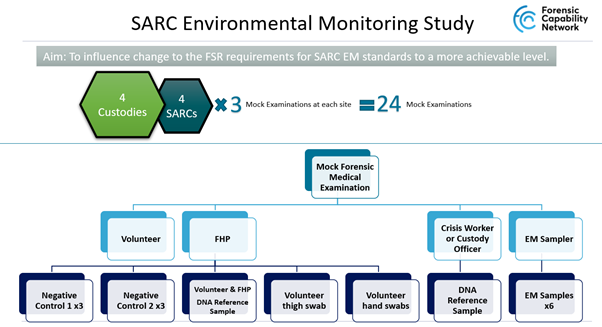Promotions and new recruits at FCN
10th April 2024
There are 55 Sexual Assault Referral Centres (SARCs) in England and Wales providing specialist medical and forensic services to the victims of rape and sexual assault. They’re currently expected to meet similar standards of environmental monitoring as DNA laboratories. This is a very high bar and places considerable pressure on the SARC services.
There are significant differences in working practice and environments between a SARC and a DNA laboratory and holding SARCs to similar monitoring standards risk consistent failures of compliance, resulting in the SARC having to close for cleaning and additional environmental testing. As well as costing money and resources, any closure could potentially have a serious impact on victims. Being forced to travel to a SARC further from home could prolong the trauma and increase the risk of someone deciding not to go ahead with a forensic medical examination. Any delay also reduces the window for gathering forensic evidence.
To influence change to the current SARC environmental monitoring criteria the FCN has been working with SARCs and academic colleagues to study environmental monitoring practices.
In a paper published earlier this year, Dr Carolyn Lovell (FCN R&D Lead) Paul Smith and Katie Jetten (University of Portsmouth) looked at cleaning and decontamination procedures in SARCs. The paper, titled “Set up to ‘fail’? Implementing contamination minimisation procedures and environmental monitoring in a Sexual Assault Referral Centre” reviews the implementation of contamination reduction procedures at one SARC, providing a longitudinal examination of the outcomes of environmental monitoring procedures over a 12-month period.
Dr Lovell said:
“SARCs do a vital job in serving victims of crime and gathering essential evidence. Ensuring the integrity of that evidence is of paramount importance in mitigating the risk of miscarriages of justice or failed cases. Integral to this is working in collaboration and investment in research to support implement more effective approaches that work within ‘real-world’ and local constraints.”
Taking this paper as inspiration, FCN Quality Specialist Michelle Gaskell and Subject Matter Expert Kevin Sullivan have carried out a study to test how a more practical monitoring regime would work, while ensuring the integrity of the evidence gathered.
The study conducted 24 mock forensic examinations across four custody sites and four SARCs. You can see a summary in the graphic below:

Michelle said:
“This is a very exciting study because we believe it is possible to change the monitoring standard for SARCs to more appropriate and practical levels. That will potentially save SARCs considerable time and expense as well as most importantly reducing the risk of prolonging the ordeal for victims.”
Dr Lovell added:
“I’m really pleased to see academic research leading to collaboration between policing, academia and SARCs. I really hope this results in practical benefits to SARCs and a better service to victims”